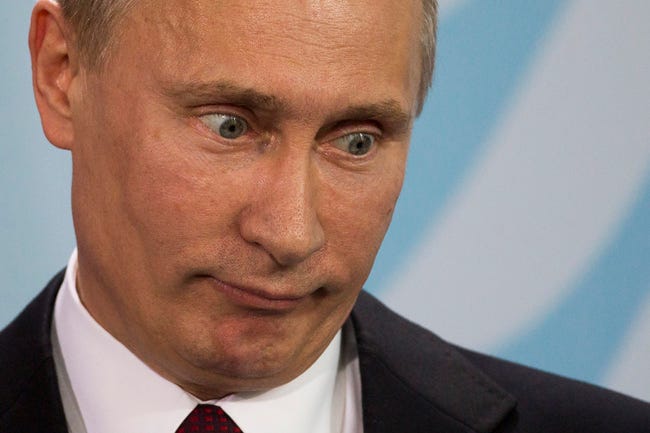News Flashed (I): Vlad to the Bone
Russia's ill-conceived invasion lurches on, war crimes and all
You’d be forgiven, pursuing my three most recent posts, for presuming that I am solipsistic in the extreme. You’d be forgiven for thinking this because it is, in fact, more or less true.
Occasionally, however, one manages raise his eyes to the horizon to test the state of the world, which, honestly, he mostly finds wanting. Nevertheless, good citizenship demands that he track important events.
Today, then, we turn our attention to the the Russian Federation’s horrific invasion of Ukraine. The six-week-old conflict’s human, economic, and political costs continue to climb, as the following items suggest:
The United Nations High Commission on Human Rights reported yesterday that from the start of the invasion on Feb. 24 to midnight April 6, one thousand, six hundred and eleven Ukrainian civilians have died. Two thousand, two hundred and twenty-sevenhave been injured. In late March, a month after the conflict began, NATO estimated that between seven thousand and fifteen thousand members of Russia’s armed forces had died, and tens of thousands more had been wounded or captured.
A Russian rocket attack yesterday on a train station in the city of Kramatorsk, a key evacuation point, left thirty-nine dead and ninety wounded, Ukrainian officials said. Bodies littered station platforms. “There are so many corpses, there are children, there are just children,” a woman screamed on a video, this morning’s Times reported. The Kramatorsk City Council released a statement reading, in part, “The Russians are deliberately trying to disrupt the evacuation of civilians.” The city’s mayor said that the four thousand civilians at the station under attack comprised mostly women, children, and the elderly. The Russia Defense Ministry called reports of the attack “a provocation.”
The Feb. 24 invasion and subsequent Russian occupation of Bucha, seventeen miles northwest of Kyiv, has occasioned reports of Russian snipers killing civilians, Russian tanks flattening townspeople’s bodies into “human rugs,” Russian-built torture chambers, and sexual assaults on young girls. The shocking atrocities prompted Bernard Zonneveld, a Dutch national who serves as chair of Rusal, a Russian aluminum manufacturing company, to call for an investigation into what he dubbed the “fratricidal” fighting in the area. Ukraine and some western governments have accused Moscow of war crimes. The Kremlin calls the claim a “monstrous forgery.”
The World Health Organization said in a statement Thursday that it had verified more than a hundred attacks on Ukrainian health care sites and ambulances since Russian forces invaded the country on Feb. 24. The attacks have left seventy-three dead and fifty-one injured. Most of the strikes hit health-care facilities. “We are outraged that attacks on health care are continuing,” Dr. Tedros Adhanom Ghebreyesus, the W.H.O.’s Director General, said.
The United Nations this week suspended Russia from the Human Rights Commission over what it called “gross and systematic violations and abuses of human rights” in Ukraine. U.S. Ambassador Linda Thomas-Greenfield, called Russian President Vladimir Putin “an egregious human rights violator [who] will not be allowed to occupy a position of leadership on human rights at the U.N.” Hearing of the suspension, Moscow then quit the commission.
The European Union’s new “freeze and seize” task force has confiscated $33B in assets tied to Russian and Belarusian individuals, and has blocked transactions valued at well over $2T, the European Commission said today. Japan has ramped up sanctions on imports, and other western countries continue to enact similar measures.
Vladimir Putin’s small-minded big-man complex, and his increasing isolation even from once-trusted advisors, appear to have left him deluded. He believed that Ukrainians would welcome his “liberating” army. Instead, scrappy Ukrainian forces (and civilians) fought fiercely, including to a stalemate in the capital city of Kyiv. (Early reports suggested that Russian forces faced food and fuel shortages and low morale.) More than four million Ukrainians—mostly women, children, and the elderly—have fled the country, and more are trying to leave. The men who remained have battled valiantly. Nevertheless, Russian attacks have demolished hospitals, kindergartens, maternity wards, and more, leaving Ukrainian cities rubbled.
The Russian economy now suffers under harsh international economic punishment. The United States, hitting close to home, recently announced sanctions against Putin’s two daughters and others close to the president. But these obstructions so far have failed to stem Putin’s push to realize his vision of a re-unified, Soviet-era-style Russia, one he’s held for more than two decades, Putin watchers suggest.
Some experts predict that Putin soon will lose power. Not everyone agrees, citing polls showing Putin’s growing popularity within Russia. Certainly he is surprised by the failure of his armed forces. Two weeks ago he purged members of his inner security circle whom he believed misled him on the war’s progress. And it must drive him mad that Ukrainian President Volodymyr Zelenskyy has emerged an international hero and an icon of effective leadership.
The great fear now is that Putin will attempt to draw nearby NATO countries into the fray—and, most appallingly, that he might launch nuclear warheads.
No one knows the end-game here. Not yet, anyway. All we can do is wait and watch. And hope—especially that Putin’s monstrous self regard, or the courage of his inner circle (if such exists), keeps his thumb off the red button for now and for good.



